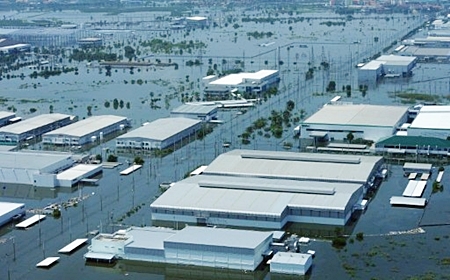BANGKOK, Nov 17 — The Thai Industries Sentiment Index (TISI) in October fell to 89.0 from 90.7 in September, hitting a 26-month low, due to the country’s flood crisis, according to the Federation of Thai Industries (FTI).
FTI Chairman Payungsak Chartsuthipol said the index, calculated based on a survey of 732 industrial operators in 40 industries, dropped in terms of purchase orders, total sales, production, and operating costs as a result of the Thailand’s worst recorded flooding.

The decline impacted the Thai economy overall, particularly the flood-hit manufacturing sector, as industrial estates in the central provinces of Ayutthaya and Pathum Thani as well as nearby areas were submerged. The flooded industrial zones house major industrial production centres, including automotive, automobile spare parts, electrical appliances and electronic parts factories, which have currently been damaged by the inundation.
The flooding also affected the production of related industrial sectors, employment and income of workers, according to the FTI. The statistical drop reflected slow domestic consumption oveall.
As the water clogging main roads disrupted or delayed goods deliveries, disrupted traffic caused shortages of consumer products during the flooding.
According to the survey, entrepreneurs are concerned about post-flood industrial rehabilitation, shortages of raw materials and possible price hikes on raw materials.
The October index sliding below the benchmark of 100 means that industrial operators felt pessimistic about their overall operations.
Meanwhile, the Thai Industries Sentiment Index in the next three months was projected to edge up to 101.3, from the 94.0 forecast in the previous month.
However, Mr Payungsak said that most entrepreneurs agreed that the government should rebuild investor confidence in a prevention measure against the possible flooding in the future, delay implementation of the Bt300/day minimum wage, speed up relieving flood-stricken industrial manufacturers, resolve labour shortages, provide low-interest loan sources for the affected operators and deal with the shortages and rising prices of raw materials.




